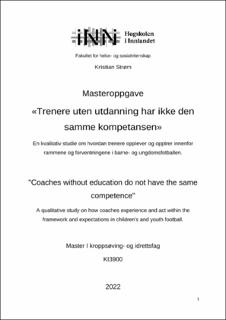«Trenere uten utdanning har ikke den samme kompetansen»
Master thesis
Permanent lenke
https://hdl.handle.net/11250/3039590Utgivelsesdato
2022Metadata
Vis full innførselSammendrag
SammendragDenne kvalitative studiens hensikt er å undersøke hvordan frivillige trenere opplever og iscenesetter sin trenerrolle opp mot trenerrollens rammer og forventninger innenfor barne- og ungdomsfotballen, og om det er forskjeller i opplevelse og opptreden om de har trenerutdanning eller ikke.Datamaterialet er samlet inn ved hjelp av semistrukturerte intervjuer av fire trenere fordelt på fire ulike klubber, hvorav to med utdanning og to uten utdanning. Datamaterialet er blitt analysert i tråd med en modell for tematisk analyse. Resultatene fra dette er diskutert i lys av sosiologisk teori og tidligere forskning.Funnene i denne studien viser at utdanning blir sett på som viktig for å kunne opptre og tilsynelatende fremstå som kompetent innenfor trenerrollens rammer og forventinger. Ønske om å iscenesette seg som kompetent gjelder også trenerne uten utdanning, hvorpå de heller presenterer sin tidligere spillererfaring som kompetansegrunnlag.Videre funn viser at mange ikke-utdannede trenere også er foreldretrenere, og det ser ut til å ha en betydning for opptreden. Foreldretrenere ser ut til å i større grad endre sin opptreden for å unngå konflikter med publikummet sitt. Det er allikevel tegn som kan tyde på at utdanning og kompetanse har en betydning, hvor de utdannede trenerne er klar på at kompetansen deres er større enn foreldrene til spillerne på laget, og at de er best egnet til å ta de riktige valgene.Det vises også at å opptre som fotballfaglig kompetent blir sett på som noe viktigere i ungdomsfotballen enn i barnefotballen. Det er derimot felles enighet om at trenerutdanning er å foretrekke for å opptre som kompetent innenfor trenerrollens rammer og forventninger.
Nøkkelord: Frivillige trener, trenerutdanning, opplevelse av trenerrollen, opptreden og iscenesettelse, rammer og forventninger AbstractThe purpose of this qualitative study is to investigate how volunteer coaches experience and stage their coaching role against the framework and expectations of the coaching role within children's and youth football, and whether there are differences in experience and behavior whether they have coaching education or not.The data has been collected using semi-structured interviews with four coaches distributed among 4 different clubs, two of which have education and two without education. The data material has been analyzed in line with a model for thematic analysis. The results from this are discussed in the light of sociological theory and previous research.The findings in this study show that education is seen as important to be able to act and appear competent within the framework and expectations of the coaching role. The desire to present themselves as competent also applies to coaches without education, whereupon they instead present their previous playing experience as a basis for competence.Further findings show that many uneducated coaches are also parent coaches, and this seems to have an impact on performance. Parent coaches seem to change their behavior to a greater extent to avoid conflict with their audience. There are still signs that education and competence are important, where the educated coaches are aware that their competence is greater than the parents of the players on the team, and that they are best suited to make the right choices.It is also shown that acting as football-competent is seen as something more important in youth football than in children's football. However, there is general agreement that coaching courses and educations are preferable to act competently within the framework and expectations of the coaching role.
Keywords: Volunteer coaches, coach training, experience of the coaching role, performance and staging, framework and expectations
